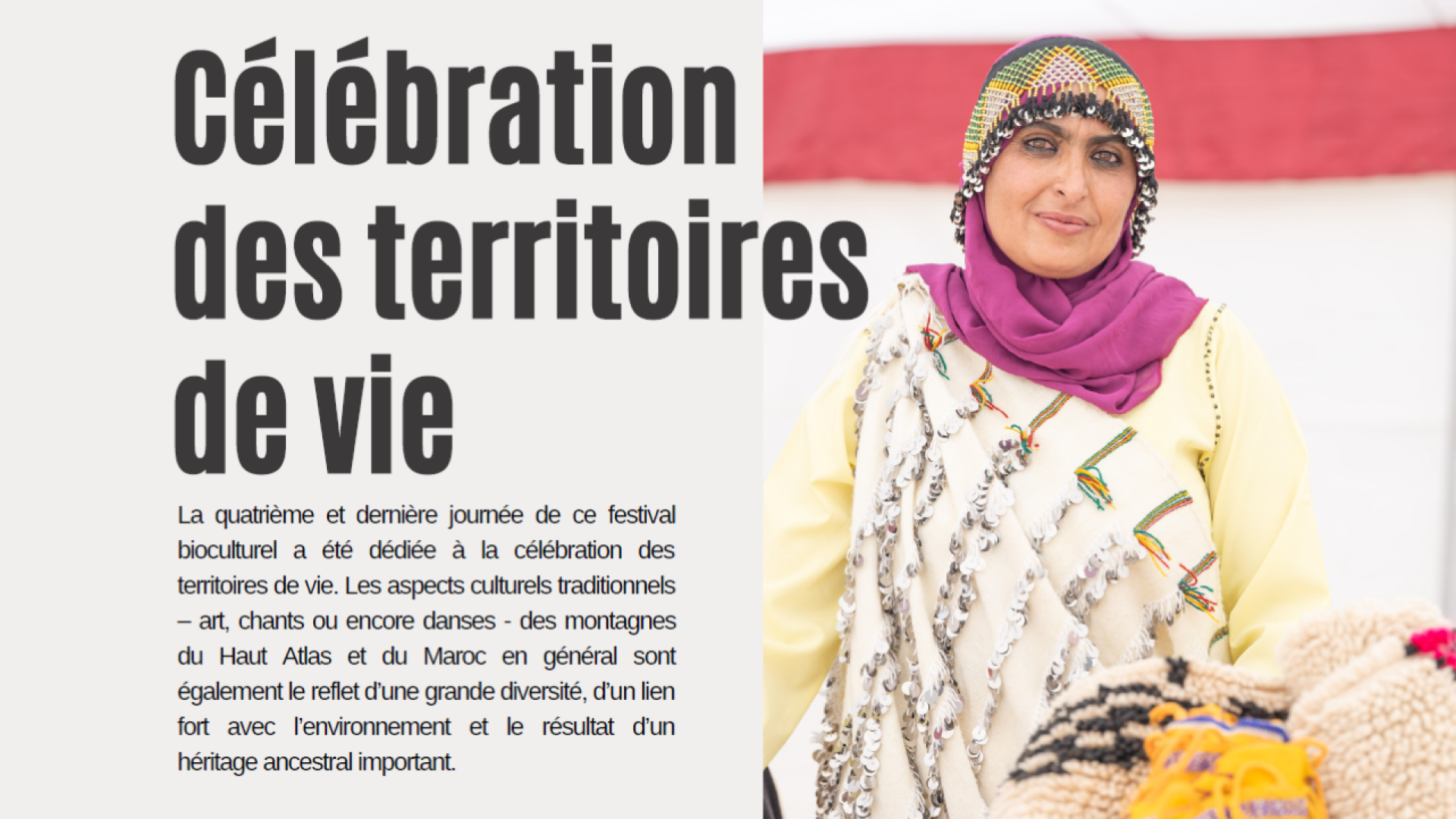In July 2022, the Biocultural Festival of Morocco, organized by the Moroccan Biodiversity and Livelihoods Association (MBLA, ICCA Consortium Member), focused on sustaining territories of life and preserving farmers' seeds and traditional culinary knowledge. It also emphasized semi-nomadic pastoralists and the Agdals' contributions to biodiversity conservation
First published on 03/20/2023, and last updated on 04/17/2023
Written by y the Moroccan Biodiversity and Livelihoods Association (MBLA), a Member of the ICCA Consortium
Translation from French: Sterling Ellsworth
The second edition of the Biocultural Festival of Morocco was held from July 25th to 28th, 2022, in Azilal and the rural community of Ait M’Hamed against the backdrop of the celebration of the United Nations Decade on Ecosystem Restoration and the discussions around the new post-2020 Global Biodiversity Framework.
The complete illustrated report of the festival is available here.
Coming together to reflect on how to sustain territories of life
The first day started with a hybrid session on sustaining territories of life. This session featured contributions from representatives of various provincial and regional institutions, civil society, and experts in biodiversity conservation and supporting local communities.
More than 200 people participated in this meeting, including several members of the ICCA Consortium and both local and foreign researchers, such as Ms. Najwa Es-Siari, Coordinator of the ICCA Consortium Morocco; Lahcen Kabiri, President of the Association Oasis de Ferkla pour l’environnement et le Patrimoine (AOFEP) and Coordinator of the Oasis Areas for the ICCA Consortium Morocco; Holly Jonas, International Coordinator of the ICCA Consortium; Aquilas Koko Ngomo, then Regional Focal Point of the ICCA Consortium for Africa; Pablo Dominguez, a researcher in the field of biodiversity conservation at the CNRS in France and Honorary Member of the ICCA Consortium.
The presentations and discussions were split into two panels: “Sustaining territories of life and supporting nature conservation efforts at the global level” and “A journey through the territories of life of the Mediterranean.”
Preserving farmers’ seeds and traditional culinary knowledge
The second day of the festival was devoted to the Farmers’ Seed Fair. It featured several activities: workshops on various topics, screenings, discussions, debates, exhibitions, seed exchanges, and a cooking competition.
The meeting took place in the rural community of Ait M’Hamed in a welcoming space under cover of a nomadic tent. The participatory approach adopted sparked a lively discussion among the participants as researchers of the MBLA community shared presentations, testimonies, and stories about their experience in seed and biodiversity conservation.
The cooking competition, entitled “The culinary arts of the Amazigh territories of life,” showcased the vital role that the rural women of the High Atlas play in preserving traditional culinary knowledge and agrobiodiversity. This competition featured eighteen contestants from several local communities who prepared dishes embodying local culinary wisdom.
The day ended with a tour of the stands of some local cooperatives, which showed off their traditional products to the public – local specialties, cosmetics, textiles, and more was on display.
Promoting the traditional knowledge of semi-nomadic pastoralists and the contribution of the Agdals
On the festival’s third day, they started with a screening of the documentary Ait Atta: Nomads of the High Atlas. Following this screening, a public debate was held with the documentary’s main character, Ben Youssef Ichou, and his family. They provided us with further insights into the nomadic way of life and the most common challenges they faced during their long-distance transhumance. This workshop sought to promote the traditional knowledge of semi-nomadic pastoralists and highlight the vital contribution that they – as well as the Agdals (in French) – make to biodiversity conservation.
Throughout the festival, guided tours of the photo exhibition “Territories of life on a razor edge: the pastoral communities of the Mediterranean mountains in the 21st century” were also organized at the M’Goun Geopark Museum.
Please click here to view part of this exhibition and learn more about it.
Celebrating Territories of Life
The fourth and final day of the festival was dedicated to celebrating territories of life through the traditions of the High Atlas and Moroccan mountains, such as art, song, and dance – all of which reveal diversity, a close connection to the environment, and the legacy of long-standing traditions.
The festivities of this final day featured groups performing Tbourida (a traditional equestrian performance of the Maghreb), dance, music, and poetry.
The complete illustrated report of the festival is available here.
Looking ahead
The Biocultural Festival organized by MBLA hopes to develop into an annual event held every spring, creating a space where Morocco’s natural and cultural heritage is valued and taking the first concrete steps towards protecting this heritage and all the cultural conservation practices of the High Atlas.
Partnerships and Sponsors
This four-day event – spearheaded by the MBLA (ICCA Consortium Member), a Marrakech-based organization working in the area of biodiversity protection, livelihoods, and cultural conservation practices – was the result of a joint effort on the part of the province of Azilial, the rural community of Ait M’Hamed, the Global Biodiversity Foundation, and the AOFEP. The ICCA Consortium and other partners, such as the GEF Small Grants Programme, the Mava Foundation, and the Sigrid Rausing Trust, sponsored it.
